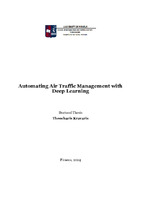Automating air traffic management with deep learning

Doctoral Thesis
Author
Kravaris, Theocharis
Κράβαρης, Θεοχάρης
Date
2024Advisor
Vouros, GeorgeΒούρος, Γεώργιος
View/
Keywords
Deep learning neural networks ; Air traffic management ; Reinforcement learning ; Multiagent systems ; Trajectory prediction ; Demand-capacity balancing ; Δίκτυα βαθιάς μάθησης ; Διαχείριση εναέριας κυκλοφορίας ; Ενισχυτική μάθηση ; Πολυπρακτορικά συστήματα ; Πρόβλεψη τροχιών ; Ισορροπία ζήτησης και προσφοράςAbstract
In recent years, Deep Learning has gained significant attention across various
fields. Artificial Intelligence in general aims to provide solutions to complex
problems, aiding human tasks. Different applications require different approaches:
some need optimal decisions surpassing human capability, while others should
model human behavior. For complex problems, expecting human experts to find
optimal solutions is unrealistic due to factors like dimensionality and decision impact
uncertainty. Optimal Artificial Intelligence agents can process vast data, making
precise decisions with high accuracy and speed, enhancing productivity and
reducing errors. However, in various domains, Artificial Intelligence must consider
human preferences and tolerance, guiding operators through complex situations
without exceeding human capabilities. This enhances safety and trust, as
the system’s recommendations have the potential to become more transparent and
self-explanatory.
The aim of this PhD is to study solving complex problems in the Air Traffic Management
domain. Demand and capacity balancing problems occur when airspace
demand exceeds capacity, leading to “hotspots.” Hotspots are resolved through
capacity and flow management solutions, such as regulations causing delays and
rerouting. These solutions introduce uncertainty in scheduling operations, leading
to time buffers, accumulated demand for resources, increased costs, and negative
impacts on airlines’ reliability, customer satisfaction, and environmental footprint.
Another aspect of Air Traffic Management which this work delves into is aircraft
trajectory prediction, the process of forecasting the future position and motion of
an aircraft. It is typically done using mathematical models, algorithms, and various
data sources. Accurate trajectory prediction is crucial for ensuring air traffic safety,
optimizing flight routes, reducing delays, and improving fuel efficiency.
This thesis contributes, through the application of Deep Learning techniques in
the Air Traffic Management domain, to scalability of Deep Reinforcement Learning
methods in resolving congestion problems and to transferability of knowledge gathered
through Imitation Learning methods to predict aircraft trajectories. Specifically,
the thesis proposes a Deep Multi-Agent Reinforcement Learning method for
resolving demand-capacity imbalances in real-world Air Traffic Management settings
with thousands of agents. In addition, it proposes a novel formulation addressing
the problem of building transferable aircraft trajectory prediction models,
casting the prediction problem as a transferable Deep Imitation Learning task.


